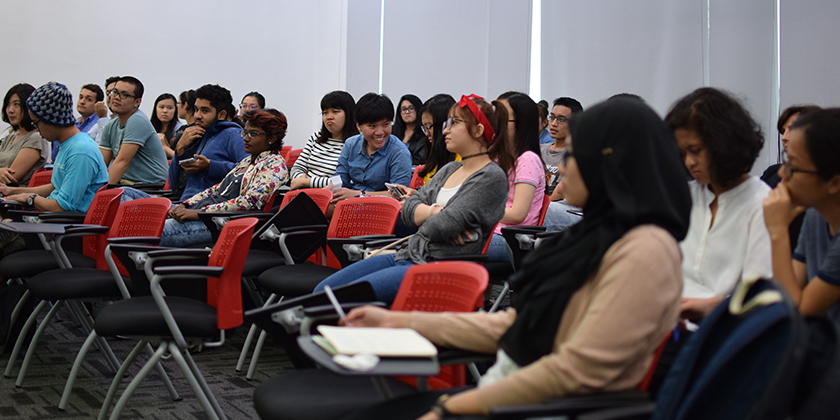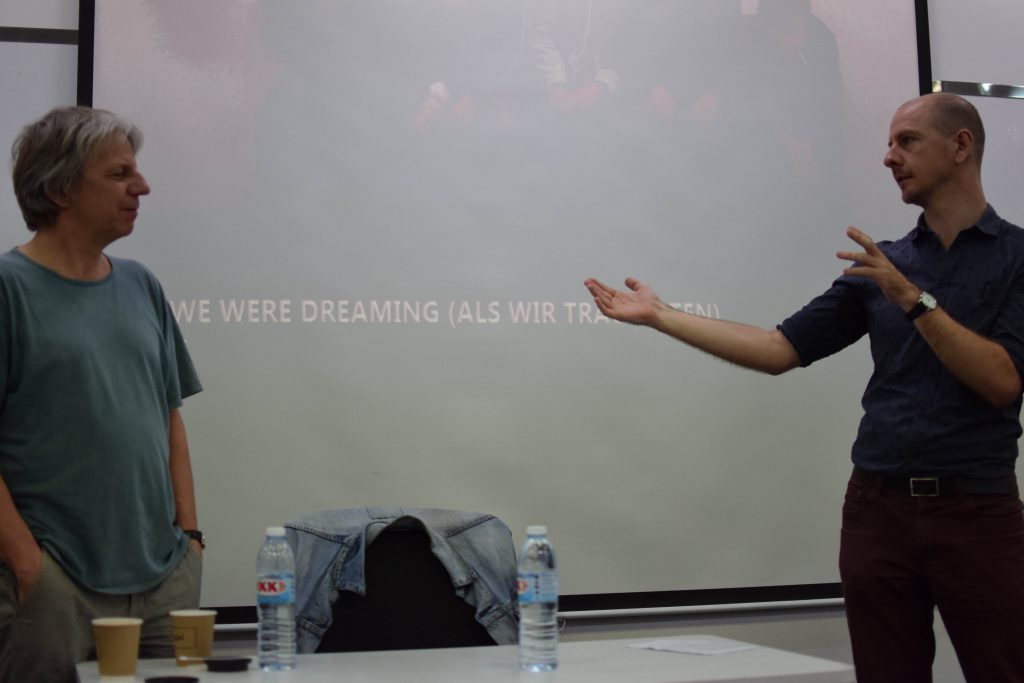
March 21, 2017, by Communications
Masterclass with Andreas Dresen
SEMENYIH: On 27 February, staff and students joined a masterclass on film directing conducted by Andreas Dresen, an award-winning German director. He was in Malaysia to serve as a jury member of the Malaysian International Film Festival (MIFFEST).
This masterclass was the second part of the Andreas Dresen programme organised by the School of Modern Languages and Cultures in association with the Goethe Institute.
The first part was a screening of two of his feature films, Grill Point (Halbe Treppe, 2002) and As We Were Dreaming (Als wir träumten, 2015), and was held on 24 February.
The masterclass, moderated by Dr Thomas Barker, was structured as an informal talk with Dresen encouraging questions from the audience. He began by introducing himself, speaking of his varied experience in working with films, television, and even theatre for over 30 years.
Dresen spoke briefly about the two films screened, noting differences between the filmmaking process. The filming of Grill Point was much more experimental, with a fully improvised script and a small cast, crew, and budget. On the other hand, As We Were Dreaming is an adaptation of a book by German writer Clemens Meyer. He offered the audience two options: to speak about traditional filmmaking (in which case a focus on As We Were Dreaming would be apt) or to discuss the documentary approach, which he noted might be useful as a way of breaking into the industry due to its lower budget.
Dr Barker started off with a question about how Dresen came up with the storyline of Grill Point, which revolves around two couples having affairs with one another. Dresen observed that the story itself wasn’t unusual; what was different was the way it was filmed, which made it less constrained by time and budget. At that time, he had realised that many works were becoming predictable, and was subsequently inspired when working with actors in the theatre. As opposed to traditional filmmaking where actors are like ‘marionettes’, he decided to work with the cast to develop the story, allowing them to have more creative input. He told them:
“Figure out how the scene works, and then we will follow your intention, not vice versa.”
He had not initially intended for the script to be fully improvised, but as filming went on, he realised a need for more freedom for the actors to find their own words.
When asked how many crew members he had, Dresen replied that there were altogether seven people: a director, an operator, a sound engineer, a costume designer, a set designer, an editor, and a production manager. He didn’t want to shoot the film in Berlin but opted to locate it in Frankfurt (Oder). This was so that the cast and crew could hang out even after work hours, which brought up opportunities to develop the storyline through their relationship with each other.
Moreover, Dresen frequently emphasised the realistic aspects of the film, saying that even the selection of the characters’ professions was inspired by a trip around the area. The actors then worked or volunteered at these venues, all of which were documented. He explained, thus, “the starting [of the movie] was not fictional storytelling; the starting point was a step together with the actors into the reality of the city.”
A question from the audience prompted him to explain the presence of the birds and the musicians (played by the band 17 Hippies) in the film, which in fact served as comedic elements and character development. The birds were drawn upon his personal experience with his parents, whereas the music provided a background score different from typical film music.
Dresen also fielded a few questions which were more technical, such as the time it took to complete the filming (two and a half months) and the challenges faced when using digital technology as opposed to the 35mm format. However, he repeatedly asserted that these obstacles (such as lower picture quality and having to rely on natural lighting) didn’t matter as much for this type of storytelling. The relative lack of restraints financially, technically, and schedule-wise allowed for more creativity and better acting.
In response to a question about general advice for filmmakers, Dresen cautioned that improvisation requires a lot of preparation and control. It might be best for beginners to start with a more classical approach, i.e. learning the rules before breaking them. Furthermore, directors should be open to creative input from the cast and crew, he advised. In fact, this applies to life as well, where people shouldn’t be too egocentric or afraid to take risks. As he quoted Beckett:
“Ever tried. Ever failed. No matter. Try Again. Fail again. Fail better.”
Dresen also spoke about directors he recommends (which include some neorealistic filmmakers), whether he would shoot a film outside Germany (not at the moment, but he would if there’s a story to be found), and whether he had watched any Malaysian films (yes, as part of MIFFEST, but the jury is still out).
The discussion then took a more reflective turn as audience members asked about the basics of a good film and the process of discovering one’s own style as an artist. He noted the subjectivity of the first question but stated that a good film is reflective, immersive, and contributes to cinema as a social experience which brings people together. To the second question, Dresen professed that such a thing is something that comes about by being open to your own interests, and cannot be actively searched for or learnt from others.
The session ended with his discussion of current projects, which include The Legend of Timm Thaler or the Boy who sold his Laughter (to be screened at the opening of MIFFEST) and a screenplay concerning an East German rock singer who also worked as a miner. Participants left with a better understanding of the filmmaking process, the creative struggle, and Dresen’s reflective approach to life.
Dresen was born in 1963 in East Germany and studied at the Film and Television College in Potsdam-Babelsberg until 1991. After working for some years in television in the 90s, he returned to cinema in 1999 with Nightshapes (Nachtgestalten), which was entered into the 49th Berlin International Film Festival.
BLURB: German filmmaker Andreas Dresen gave a masterclass on the filmmaking process, with much discussion centring around his 2002 feature-length film Grill Point (Halbe Treppe).
-
Post a comment

